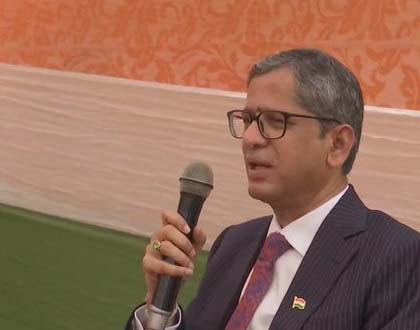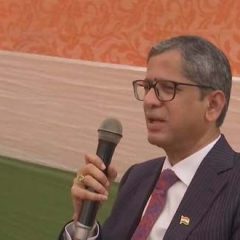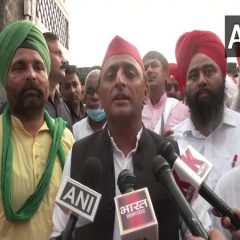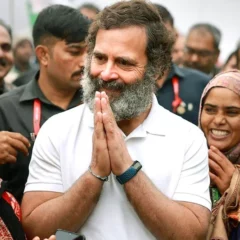Chief Justice of India NV Ramana on Saturday pushed for “complete financial autonomy of the judiciary” through the establishment of a National Judicial Infrastructure Authority (NJIA) of India.
New Delhi [India] : Noting that good judicial infrastructure for Courts in India has always been an “afterthought”, the CJI said he has sent a proposal for setting up the NJAI to the Ministry of Law and Justice. CJI Ramana urged law minister Kiran Rijiju to ensure that the proposal is taken up in the upcoming Winter Session of the Parliament.
“If we want a different outcome from the judicial system, we cannot continue to work in these circumstances. An integral aspect, in this regard, is the financial autonomy of the judiciary. I have, therefore, sent a proposal for the establishment of the National Judicial Infrastructure Authority to the Ministry of Law and Justice, and I am hoping for a positive response soon. I urge the Hon’ble Minister of Law and Justice to expedite the process and ensure that the proposal to create the National Judicial Infrastructure Authority of India (NJIAI) with statutory backing is taken up in the upcoming Winter Session of the Parliament,” CJI Ramana said.
He added that “Institutionalising the mechanism for augmenting and creating state-of-the-art judicial infrastructure is the best gift that we can think of giving to our people and our country in this 75th year of our Independence.”
CJI further said that good judicial infrastructure for Courts in India has always been an “afterthought” and it is because of this mindset that Courts in India still operate from “dilapidated structures” making it difficult to effectively perform their function.
“Judicial infrastructure is important for improving access to justice and to meet the growing demands of a public that is more aware of its rights and is developing economically, socially, and culturally. It is baffling to note that the improvement and maintenance of judicial infrastructure is still being carried out in an ad-hoc and unplanned manner,” he further said.
Speaking at the inauguration function of the annexe building of Aurangabad Bench of the Bombay High Court, CJI said the Aurangabad Bench complex provides a good example of the issue he wishes to highlight.
The need for an additional Court complex at the Aurangabad Bench was
identified as early as in 2011, at a meeting convened by the then senior-most judge at this Bench, he said, adding that it has taken more than 10 years for this vision to be implemented is “extremely worrisome”.
“This is not the fault of any institution or organ of the State but is emblematic of a deeper structural problem that has plagued judicial infrastructure development in our country since independence. Today’s success should not, therefore, blind us to the issues that exist,” CJI added.
“An effective judiciary can aid in the effective growth of the economy, CJI Ramana further said. He said according to international research published in 2018, failure to deliver timely justice cost the country as much as 9 per cent of annual GDP. Moreover, the impact of an under-supported judiciary is also seen on foreign investments. Without adequate infrastructure, we cannot aspire to fill this gap,” be further stated.
CJI said that it is a common notion that only criminals or victims of crime approach the court. “People take pride in stating that we have never seen a court building in our lifetime. But, it is high time that we make efforts to remove the taboo associated with approaching Courts for the affirmation of their rights.,” He added.
The common man deals with multiple legal issues during his lifetime, one must never feel hesitant to approach Courts, said CJI.
“After all, people’s faith in the judiciary is the biggest strength of democracy. Courts are extremely essential for any society that is governed by the rule of law. Court buildings are not merely structures made of mortar and bricks. Rather, they actively assure the constitutional guarantee of the Right to Justice. The Courts in India have repeatedly upheld the rights and freedoms of individuals. They stood up whenever the individuals or society are at the receiving end of the executive excesses. It is an assurance that the seeker of justice, howsoever weak, need not worry about the might of the State,” CJI said.
The event was also attended by Maharashtra’s Chief Minister Uddhav Thackeray, Law Minister Kiren Rijiju, Supreme Court Judges — Justice UU Lalit, Justice DY Chandrachud, Justice BR Gavai, Justice Abhay Oka, Chief Justice of Bombay High Court Dipankar Datta, Senior most judge at Aurangabad Bench Justice SV Gangapurwala and Advocate General Ashutosh Kumbhakoni.
Justice Chandrachud in his address said that this building today is a landmark in the history of Aurangabad and Maharashtra and this building represents the ethos of Marathwada, it represents the value of diversity, tolerance and plurality of this State.
He said, “We have formulated live streaming rules so that courts can live stream its proceedings to the masses.”
Everyone in the country has a right to know what goes inside a courtroom, he added.
Justice Chandrachud also said that the object of both judges and lawyers is to administer justice to the common man and it is this quest for justice that unifies the Bench and the Bar.
Justice Chandrachud further said the government is the largest litigant and he has written to the Chief Justices of all High Courts to request that by January 2022, the cases must be e-filed in the district and High Courts.
Justice Lalit expressed happiness on the inauguration of the annexe building. “It is a cause of celebration for us, jubilation but it is up to us to put that life and spirit into this structure and make it into a temple of justice in the true sense,” Justice Lalit said.
Law Minister Kiran Rijiju said that “Judiciary is not only being given full support but also they are being given space for the judiciary to become robust. In democracy to make our democracy successful, a robust judiciary is of utmost importance. “
“We have taken many decisions to provide support to infrastructure to the judiciary,” Rijiju said.
“I am going to Jammu and Kashmir on October 29 for the purpose of overseeing and understanding how legal aids and legal awareness are being provided to the last mile person standing in the border area,” he added
Rijiju further said that Supreme Court emerged as a legal leader with over 96,213 virtual hearings till July 9, 2021, and upgraded cloud-based video-conferencing infrastructure.
“I am also looking forward for a harmonious relationship between the judiciary, executive and legislature. We all are working for our nation. We are committed to dispensing justice to the nation and its citizens. We are a team, we are different organs of our set-up, states. I consider myself to be part of the team,” he added.
The Law Minister further said that “Politics is always there because politics is the essence of democracy. When it comes to democracy, there has to be politics, but there is no politics in the judiciary.”
He also mentioned that former Chief Minister Devendra Fadnavis laid the foundation of the annex building in Aurangabad Bench, and present Chief Minister Uddhav Thackeray is laying the foundation. “This is teamwork,” he added.







